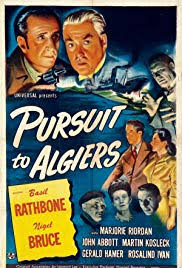
“Now you must sing for me doctor, you promised you know.”
Sherlock Holmes (Basil Rathbone) and Dr. Watson (Nigel Bruce) are on their way to a vacation of fishing when they are waylaid by a series of clues urging them to a clandestine meeting. Holmes is intrigued and so follows the clues. He is met by the Prime Minister (Frederick Worlock) of a country called Rovinia. The King has been assassinated and the prime minister wants to hire Holmes to smuggle his heir, Prince Nikolas (Leslie Vincent), into Rovinia. They are worried that the prince is also a target and they want to ensure that he gets home safely.
A plane has been arranged to take Holmes and the prince to Rovinia. Since there is no room for Watson on the plane, Holmes has him take a passenger ship bound for Algiers and they will meet up later.
On the voyage, Watson reads that the airplane has crashed in the Pyrenees with no survivors. Holmes foreseeing problems never got on the plane. He, and Prince Nikolas are instead already on the ship with Watson. He tells Watson to introduce the prince as his nephew to other passengers. Watson, of course, suspects everyone on the ship is an assassin. When the ship makes an unscheduled stop at Lisbon three men board. Gregor (Rex Evans), circus knife thrower Mirko (Martin Kosleck), and a mute named Gubec (William 'Wee Willie' Davis).
Three trained assassins against one Sherlock Holmes. No contest.
“Pursuit to Algiers” was released in 1945 and was directed by Roy William Neill. It is the 12th of the 14 Rathbone/Bruce collaborations. This is the only Holmes film that you see Holmes wearing pajamas. You also get to hear Dr. Watson sing. And I believe it really is Nigel Bruce singing.
This is third of the four movies in the series that Mrs. Hudson, Holmes’ landlady does not make an appearance. Some believe her first name is Martha but there is no direct reference to that in Doyle’s stories. Very little is known about her at all. The longest reference to her in the canon stories is:
"Mrs. Hudson, the landlady of Sherlock Holmes, was a long-suffering woman. Not only was her first-floor flat invaded at all hours by throngs of singular and often undesirable characters but her remarkable lodger showed an eccentricity and irregularity in his life which must have sorely tried her patience. His incredible untidiness, his addiction to music at strange hours, his occasional revolver practice within doors, his weird and often malodorous scientific experiments, and the atmosphere of violence and danger which hung around him made him the very worst tenant in London. On the other hand, his payments were princely. I have no doubt that the house might have been purchased at the price which Holmes paid for his rooms during the years that I was with him. The landlady stood in the deepest awe of him and never dared to interfere with him, however outrageous his proceedings might seem. She was fond of him, too, for he had a remarkable gentleness and courtesy in his dealings with women."
―Dr Watson

